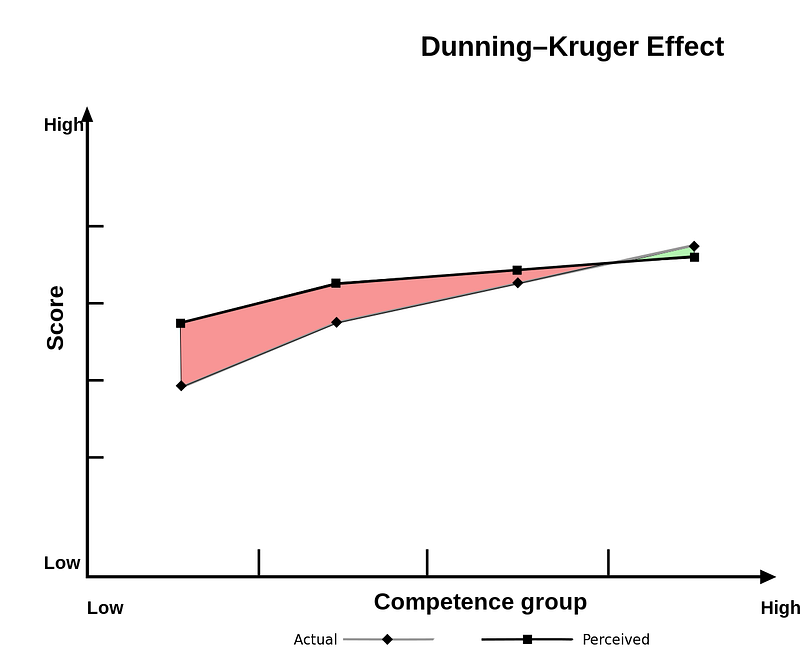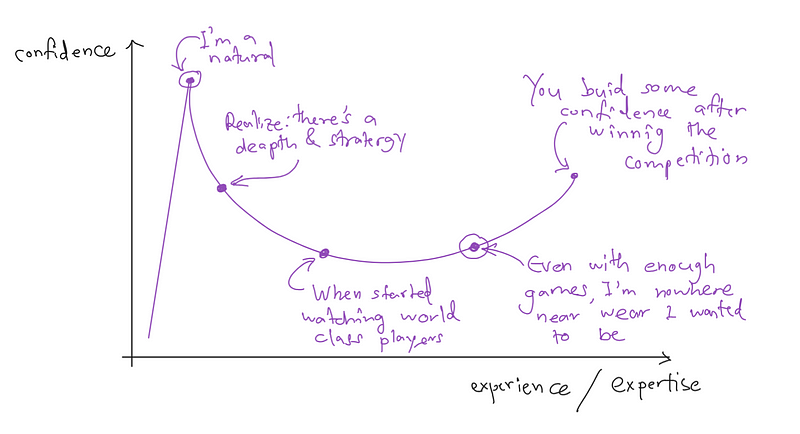Understanding the Dunning-Kruger Effect: A Guide to Awareness
Written on
Chapter 1: The Dunning-Kruger Effect Explained
Imagine engaging in a heated discussion with colleagues, feeling like an expert, only to later discover that many of your claims are fundamentally flawed. You may confidently take charge of a project, excel in your initial presentations, only to realize that your time estimates and plans were significantly off. Welcome to the Dunning-Kruger effect.
This phenomenon is prevalent in our everyday lives, with many of us, including you and me, overestimating our capabilities in various fields. However, it's crucial to recognize that there's also a flip side to this issue. In certain instances, we might downplay our skills. For example, how many talented writers attribute their success to luck? This is still part of the Dunning-Kruger effect.
The Study
In 1999, psychologists David Dunning and Justin Kruger identified this cognitive bias through a series of tests. They assessed participants' abilities in humor, logical reasoning, and grammar, asking them to evaluate their performance relative to their peers.
Dunning and Kruger made a fascinating observation: individuals with limited knowledge or experience in a subject often overestimate their competence, while those with more expertise tend to underestimate their abilities.

The accompanying graph highlights a key insight: most people remain in the realm of overconfidence. Numerous studies support this finding; for instance, around 80% of American drivers consider themselves to be expert drivers, despite the fact that there are roughly 10 million car accidents annually in the U.S. Surveys reveal that many individuals with limited political knowledge view themselves as well-informed.
Why Do We Struggle with Our Expertise?
To further illustrate this concept, consider a scenario where you begin learning chess. Initially, you grasp the basic rules and, after a few online matches, feel confident and even consider yourself a natural. You might dream of becoming a grandmaster.
However, after a few months, when you participate in a tournament against seasoned players, you realize how much deeper the game is than you thought. Years of practice may leave you feeling as though you've barely scratched the surface, causing you to doubt your abilities. When your friends encourage you to compete again, you may still feel unsure, yet surprisingly, you emerge victorious.
This example, while exaggerated, reflects a common experience. You can fall victim to the Dunning-Kruger effect multiple times, as depicted in a graph.

Initially, with little experience, you are loud and self-assured. As you gain awareness of the complexities involved, your confidence may wane, requiring time to rebuild. The Dunning-Kruger effect serves as a reminder that our self-assessment can be distorted.
Loudness Doesn’t Equate to Accuracy
Most people are not experts. Achieving expertise requires significant effort, yet many remain within the loud and overconfident group, failing to recognize the depth of knowledge required. For effective learning, one must develop metacognition—awareness of one's own thought processes.
Dunning and Kruger suggest that individuals lacking metacognitive skills in a specific area may remain oblivious to their shortcomings. This unawareness leads to misguided confidence. As Dunning notes, “In many cases, incompetence does not leave people disoriented, perplexed, or cautious. Instead, the incompetent are often blessed with an inappropriate confidence, buoyed by something that feels to them like knowledge.”
Those who are confidently incompetent often dominate discussions, whether in mass media or on social platforms, overshadowing more informed voices.
Can We Break Free from the Dunning-Kruger Effect?
The answer to this question is complex, as the Dunning-Kruger effect is often imperceptible. There isn’t a straightforward method to avoid falling victim to it, but cultivating humility is a valuable strategy. Humility allows us to acknowledge our limitations and recognize that there is always more to learn. It fosters a willingness to seek feedback, accept constructive criticism, and continually expand our knowledge, ultimately refining our self-assessment.
Even the most intelligent individuals can err. Creating a framework for yourself before voicing opinions can be helpful. Ask yourself questions such as:
- Have I sufficiently researched this topic?
- Have I consulted enough individuals about it?
- Have I considered various perspectives and my own biases?
These inquiries can be tailored to fit the specific subject matter you wish to discuss. Remember, this journey of self-awareness and growth is ongoing. Instead of attempting to escape the Dunning-Kruger effect, embrace it with a constructive mindset.
Chapter 2: Practical Strategies for Self-Improvement
The first video, "3 Ways to Think Before You Speak | Avoid Feeling Embarrassed While Speaking," offers insights into thoughtful communication and the importance of self-reflection before expressing opinions.
The second video, "Think Before You Speak," emphasizes the value of careful consideration in conversations, aiding in the development of clear and effective communication skills.